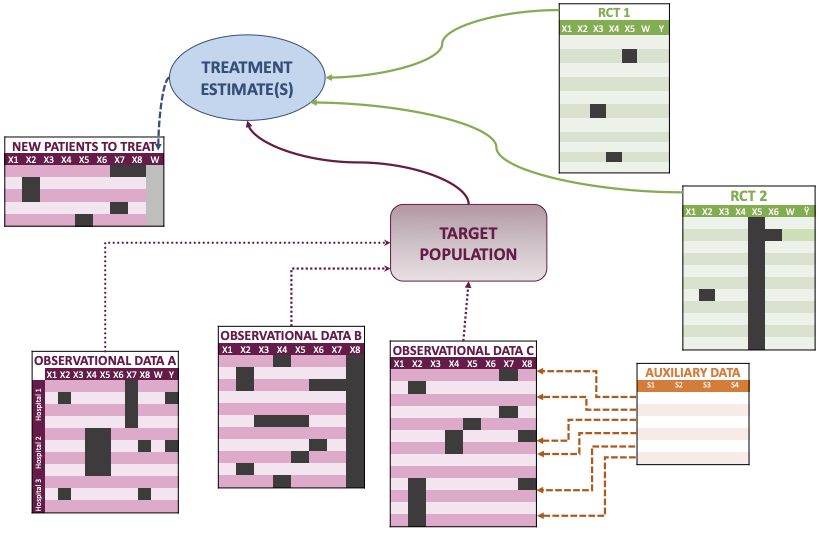Abstract
 Causal inference aims to estimate the effect of an intervention on an outcome. It can be used to evaluate the effect of a public policy, a medical treatment, an advertisement, etc.
Causal inference aims to estimate the effect of an intervention on an outcome. It can be used to evaluate the effect of a public policy, a medical treatment, an advertisement, etc.
Randomized controlled trials (RCTs) are the gold standard in the field but they often suffer from sampling bias because they are not representative of the target population. We will present estimators that correct for the distributional shift and predict the effect of a treatment in a population using external observational data. We will also discuss how to handle missing information.
Abstract
 Her first employment was in the statistics department of an Agronomy University (Agrocampus Ouest) where she was trained to « the French data analysis school » and had the opportunity to work closely with researchers from other departments and increases her interest in transversal studies. In the meantime, she prepared her PhD which was defended in 2010 and rewarded by the French Statistical Society as the best PhD in applied statistics. She has specialized in missing data, visualization and the nonparametric analyses of complex data structures. Her work was rewarded by a Marie Curie European Union grant in 2013 to increase her research potential and to spend a year at Stanford University. She spent a year as a researcher in INRIA before joining Polytechnique in 2016 as a Professor of Statistics. At Polytechnique, she was responsible of a master in data-sciences for business in collaboration with HEC. She has been a visiting researcher at Google Brain Paris, for a year (2 days a week) in 2019. In september 2020, she join Inria as an advanced researcher to set-up a team in data-science for health. She has published over 50 articles and written 2 books in applied statistics. Her experience on dealing with incomplete data is recognized by the community: she organized an ICML workshop, the MissData conference, created the Rmistatic website and she is often invited to give lectures to share her experience. Her vocation is to push methodological innovation to bring useful application of her research to the user in particular in bio-sciences and health. Her current research focuses on causal inferences techniques for personalized medicine. She leads a project with the Traumabase group dedicated to the management of polytraumatized patients to help emergency doctors making decisions. Julie Josse is dedicated to reproducible research with the R statistical software: she has developed packages including FactoMineR, denoiseR, missMDA to transfer her work, she is a member of the R foundation and of Rforwards to increase the participation of minorities in the community.
Her first employment was in the statistics department of an Agronomy University (Agrocampus Ouest) where she was trained to « the French data analysis school » and had the opportunity to work closely with researchers from other departments and increases her interest in transversal studies. In the meantime, she prepared her PhD which was defended in 2010 and rewarded by the French Statistical Society as the best PhD in applied statistics. She has specialized in missing data, visualization and the nonparametric analyses of complex data structures. Her work was rewarded by a Marie Curie European Union grant in 2013 to increase her research potential and to spend a year at Stanford University. She spent a year as a researcher in INRIA before joining Polytechnique in 2016 as a Professor of Statistics. At Polytechnique, she was responsible of a master in data-sciences for business in collaboration with HEC. She has been a visiting researcher at Google Brain Paris, for a year (2 days a week) in 2019. In september 2020, she join Inria as an advanced researcher to set-up a team in data-science for health. She has published over 50 articles and written 2 books in applied statistics. Her experience on dealing with incomplete data is recognized by the community: she organized an ICML workshop, the MissData conference, created the Rmistatic website and she is often invited to give lectures to share her experience. Her vocation is to push methodological innovation to bring useful application of her research to the user in particular in bio-sciences and health. Her current research focuses on causal inferences techniques for personalized medicine. She leads a project with the Traumabase group dedicated to the management of polytraumatized patients to help emergency doctors making decisions. Julie Josse is dedicated to reproducible research with the R statistical software: she has developed packages including FactoMineR, denoiseR, missMDA to transfer her work, she is a member of the R foundation and of Rforwards to increase the participation of minorities in the community.
The presentation will be in English and streamed on BBB

